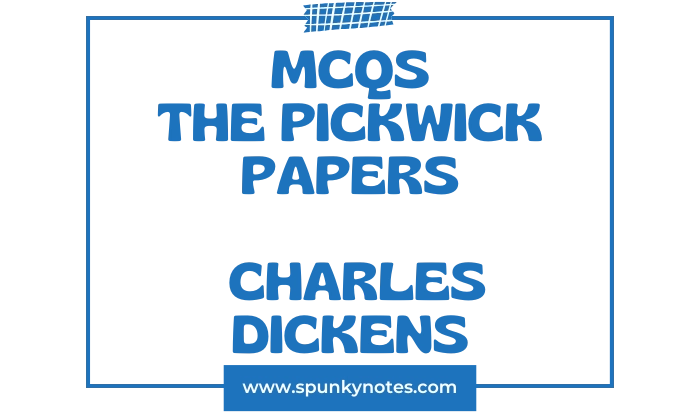

Estimated Reading Time: 18 min
The Pickwick Papers MCQs
1. Which of the following is the first novel written by Charles Dickens, published in 1836–1837?
A. Oliver Twist
B. David Copperfield
C. Great Expectations
D. The Pickwick Papers
2. The earliest history of the immortal Pickwick’s public career is derived from the perusal of an entry in the Transactions of which group?
A. The Royal Society
B. The Pickwick Club
C. The Scientific Union
D. The Literary Guild
3. What scientific theory did Mr. Pickwick agitate the world with?
A. The Theory of Relativity
B. The Theory of Light
C. The Theory of Tittlebats
D. The Theory of Optics
4. Who is described as the “too susceptible” member of the Pickwick Club, whose ruling passion is the admiration of the fair sex?
A. Mr. Pickwick
B. Mr. Snodgrass
C. Mr. Tracy Tupman
D. Mr. Winkle
5. Who is the “poetic” member of the Pickwick Club?
A. Mr. Tracy Tupman
B. Mr. Snodgrass
C. Mr. Winkle
D. Mr. Pickwick
6. Who is the “sporting” member of the Pickwick Club?
A. Mr. Winkle
B. Mr. Tupman
C. Mr. Snodgrass
D. Mr. Pickwick
7. What kind of garment, when worn by Mr. Pickwick, is said to have “inspired involuntary awe and respect”?
A. Tights and gaiters
B. Black silk waistcoat
C. Mysterious blue cloak
D. New green shooting-coat
8. What specific ancient object did Mr. Pickwick ‘discover’ that caused the club to vote him a pair of gold spectacles?
A. A Roman coin
B. A stone with a partially legible inscription
C. A Greek amphora
D. A parchment map
9. Who was the Pickwickian that called Mr. Pickwick a “humbug” during the debate?
A. Mr. Snodgrass
B. Mr. Winkle
C. Mr. Tupman
D. Mr. Blotton (of Aldgate)
10. Why did the cabman believe Mr. Pickwick was an informer?
A. Pickwick tried to run away.
B. Pickwick was recording notes in a book.
C. Pickwick was wearing a blue cloak.
D. Pickwick refused to pay the fare.
11. Who intervened to terminate the affray between the Pickwickians and the mob near the cab?
A. A policeman
B. A tall, thin, young man in a green coat
C. The cabman’s master
D. Mr. Snodgrass
12. What was the name of the tall, thin, young man in the green coat who emerged from the coach-yard?
A. Mr. Tupman
B. Mr. Winkle
C. Mr. Jingle
D. Mr. Snodgrass
13. What letters were inscribed on the gilt button of the bright blue dress-coat that Mr. Winkle was wearing?
A. T. T.
B. P. P.
C. P. C.
D. W. W.
14. Why did Mr. Winkle accept the challenge to a duel?
A. He felt bound to maintain the honour of his coat/uniform.
B. He was an expert sportsman eager for a fight.
C. He was intoxicated and confused.
D. He wanted to impress the ladies.
15. Who was the fat and red-faced boy sitting on the box of the barouche?
A. Joe, the dispenser of the hamper contents
B. Mr. Wardle’s son
C. The post-boy
D. A relative of Mr. Tupman
16. Who was supposed to ride a horse, which he struggled to mount, when the party left the inn for Manor Farm?
A. Mr. Tupman
B. Mr. Snodgrass
C. Mr. Pickwick
D. Mr. Nathaniel Winkle
17. When Mr. Winkle was having trouble mounting the horse, what did the post-boy whisper to the waiter?
A. The horse was too tall.
B. The gentleman was getting up on the wrong side.
C. The gentleman was afraid.
D. The saddle was loose.
18. Which member of the Wardle family did Mr. Jingle run away with from Manor Farm?
A. Miss Wardle
B. Mrs. Wardle (the mother)
C. Rachael, the spinster aunt
D. Emily Wardle
19. What was the name of Mr. Wardle’s lawyer?
A. Dodson
B. Fogg
C. Perker
D. Snubbin
20. What action was Mrs. Bardell engaged in when she fainted in Mr. Pickwick’s arms, just before his friends entered?
A. She was attempting to serve him tea.
B. She was clinging to him.
C. She was dusting the room.
D. She was reading the resolutions.
21. Who immediately followed Master Bardell into the room just as Mrs. Bardell fainted in Mr. Pickwick’s arms?
A. Mr. Jingle
B. Mr. Wardle and Mr. Trundle
C. Mr. Tupman, Mr. Winkle, and Mr. Snodgrass
D. Messrs. Dodson and Fogg
22. What was Sam Weller’s job before becoming Mr. Pickwick’s servant?
A. Boots
B. Vaginer’s boy
C. Coachman
D. Pieman
23. What type of establishment did Sam’s father get a marriage licence at, after being persuaded by a “touter”?
A. A church in Paul’s Churchyard
B. The Commons (Doctors’ Commons)
C. The Marquis of Granby
D. Gray’s Inn
24. Where did Mr. Pickwick wake up after drinking cold punch and falling asleep during the shooting trip?
A. In the inn
B. In the pound
C. In a hay cart
D. Under a tree
25. Who is the sanctimonious and hypocritical clergyman that Mr. Weller Senior is connected to?
A. Rev. Mr. Melchisedech
B. Rev. Dr. Slammer
C. Rev. Mr. Stiggins
D. Rev. Mr. Walker
26. What were the two main political parties in the town of Eatanswill?
A. Whig and Tory
B. Blue and Buff
C. Conservative and Liberal
D. Democrat and Federalist
27. Who were the two candidates running in the Eatanswill election?
A. Mr. Perker and Mr. Pott
B. Mr. Pickwick and Mr. Winkle
C. Mr. Horatio Fizkin and Honourable Samuel Slumkey
D. Mr. Snodgrass and Mr. Tupman
28. Who was the editor of the Eatanswill Gazette?
A. Mr. Fizkin
B. Mr. Perker
C. Mr. Pott
D. Mr. Slumkey
29. What type of action was the famous lawsuit of Bardell against Pickwick?
A. Libel
B. Breach of promise of marriage
C. Assault and battery
D. Criminal conspiracy
30. What was the name of the pompous, self-important Queen’s Counsel who handled Mrs. Bardell’s case?
A. Mr. Serjeant Snubbin
B. Mr. Serjeant Buzfuz
C. Mr. Serjeant Bumple
D. Mr. Serjeant Flowery
31. What did Serjeant Buzfuz interpret Pickwick’s note about “chops and tomato sauce” to mean?
A. A secret meeting place
B. A declaration of undying love and passionate feasting
C. A plan to run away
D. A code for transferring property
32. What was the verdict in the case of Bardell v. Pickwick?
A. For the Defendant
B. For the Plaintiff, damages of 750 pounds
C. For the Plaintiff, damages of 50 pounds
D. For the Plaintiff, damages of 1000 pounds
33. What was the name of the prison where Mr. Pickwick was confined after refusing to pay the damages to Mrs. Bardell?
A. Newgate Prison
B. The Fleet Prison
C. Marshalsea Prison
D. Coldbath Fields Prison
34. Who did Mr. Pickwick unexpectedly find also imprisoned in the Fleet?
A. Mr. Wardle
B. Alfred Jingle and Job Trotter
C. Sam Weller’s father
D. Dodson and Fogg
35. What did Sam Weller do to join Mr. Pickwick in the Fleet Prison?
A. He was arrested for an assault charge.
B. He feigned an illness and got himself committed.
C. He arrested himself for a fictitious debt.
D. He became a prison warden.
36. Why was Mrs. Bardell finally imprisoned in the Fleet?
A. She was arrested for fraud.
B. She refused to pay the costs of her own case to Dodson and Fogg.
C. She was caught stealing from Mr. Pickwick.
D. She failed to appear in court.
37. What final amount did Mr. Pickwick pay to secure both his own release and Mrs. Bardell’s release from the Fleet?
A. Dodson and Fogg’s legal costs
B. The original 750 pounds damages
C. The total sum of damages plus all costs
D. Only the debt owed by Sam Weller
38. What happened to the Pickwick Club at the very end of the novel?
A. It disbanded immediately.
B. It continued its explorations without Mr. Pickwick.
C. It was dissolved, and the members retired from public life.
D. It merged with the Royal Society.
39. What was the Pickwickian that called Mr. Pickwick a “humbug” during the debate?
A. Mr. Snodgrass
B. Mr. Winkle
C. Mr. Tupman
D. Mr. Blotton (of Aldgate)
40. What did the Pickwick Club vote to give Mr. Pickwick in token of their confidence and approbation after the Blotton affair?
A. A gold watch
B. A silver inkstand
C. A pair of gold spectacles
D. A bronze bust
41. What happened immediately after the firing ceased at the military review?
A. The regiments packed up and left.
B. The half-dozen regiments charged with fixed bayonets.
C. The commander-in-chief congratulated the men.
D. Mr. Pickwick fainted.
42. What position were the soles of Mr. Pickwick’s boots elevated to after the military charge?
A. Resting on a bench
B. Elevated in air
C. Hidden in the mud
D. Running away quickly
43. Who was left at home in charge of the females while Mr. Pickwick, Mr. Winkle, and Mr. Snodgrass went to the cricket match?
A. Mr. Wardle
B. Mr. Tupman
C. Mr. Trundle
D. The clergyman
44. The cricket match featured the Dingley Dell Club against which other town?
A. Eatanswill
B. Rochester
C. Muggleton
D. Dorking
45. Who did the Pickwickians meet in the tent at the cricket match, whom they had previously met on the Rochester coach?
A. Mr. Tupman
B. Mr. Jingle (the green-coated friend)
C. Mr. Wardle
D. Mr. Miller
46. What amount did Jingle finally demand as compensation for his expenses, breach of honour, and loss of the lady?
A. Seventy pounds
B. Eighty pounds
C. One hundred and twelve pounds
D. One hundred and fifty pounds
47. What items did the crowd throw at Mr. Pickwick when he was in the pound?
A. Mud and stones
B. Turnip, potato, and egg
C. Apples and hops
D. Snowballs
48. What scandalous act did the opposing party perform to prevent fourteen unpolled electors from voting the day before the election?
A. Bribed them with money
B. Locked them in a room
C. Hocussed their brandy-and-water
D. Stole their carriages.
49. What was the name of the unprincipled lawyer, or attorney, who took Sam Weller’s deposition?
A. Mr. Perker
B. Mr. Winkle
C. Mr. Lowten
D. Mr. Jackson
50. What happened to the Pickwick Club at the very end of the novel?
A. It disbanded immediately.
B. It continued its explorations without Mr. Pickwick.
C. It was dissolved, and the members retired from public life.
D. It merged with the Royal Society.
Brief Overview
The Pickwick Papers, written by Charles Dickens and published in 1836, follows the adventures of Mr. Samuel Pickwick, a kind and curious gentleman. He travels across England with his friends Mr. Tupman, Mr. Snodgrass, and Mr. Winkle to study human behavior.
Their innocent intentions often lead them into humorous misunderstandings and curious situations, making their journey both entertaining and unpredictable. Along the way, they meet Sam Weller, a witty and loyal servant who becomes Mr. Pickwick’s trusted companion.
Through these comedic episodes, Dickens presents a vivid picture of English society, using satire to highlight foolishness and social flaws. Despite the light-hearted tone, the novel explores themes such as friendship, kindness, honesty, and moral responsibility.
As Mr. Pickwick faces challenges, he grows more understanding and compassionate toward others. The story ends with reconciliation and happiness, emphasizing the importance of loyalty and good-heartedness in human relationships.


